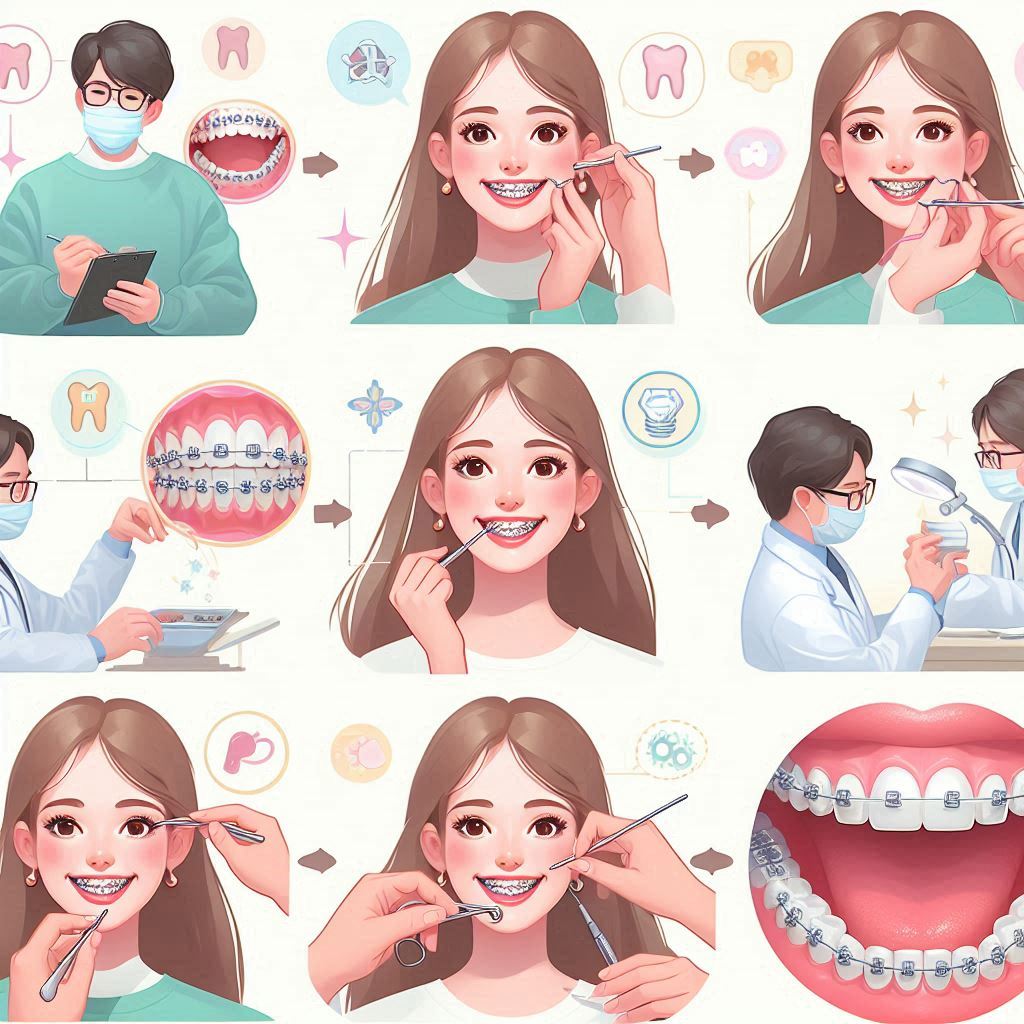Overview of Fasting
Fasting is an ancient practice that has been embraced for various reasons, from religious observances to health and wellness benefits. In modern times, intermittent fasting and other fasting methods have gained popularity as part of health regimens. While much attention is focused on its benefits for weight loss, metabolic health, and longevity, there is emerging research indicating that fasting may have significant positive effects on oral health. This article will explore the connection between fasting and dental health, offering a comprehensive guide to how fasting can impact your teeth and gums.
Purpose of the Guide
The aim of this guide is to delve into the science behind fasting’s potential benefits for your oral health and explain how it can improve not only your overall wellness but also your teeth and gums.
The Science of Fasting
Fasting is the voluntary act of abstaining from food or drink for a specific period. It is a practice that has been adopted by various cultures, religions, and individuals for centuries for reasons that include spiritual enlightenment, weight loss, detoxification, and overall health. In recent years, fasting has gained significant popularity as a method of improving overall wellness, particularly in the context of metabolic health and longevity. However, its effects are not limited to just physical health but extend to oral health as well.
What is Fasting?
Fasting is generally categorized into several types based on the length and nature of the fast:
- Intermittent Fasting (IF):
This method involves cycling between periods of eating and fasting. One of the most popular types is the 16:8 method, where an individual fasts for 16 hours and consumes all their meals within an 8-hour window. Other variations include 18:6, 20:4, and alternate-day fasting. Intermittent fasting is perhaps the most accessible form of fasting, as it can be easily incorporated into a daily routine without drastic lifestyle changes. - Water Fasting:
Involves consuming only water for a certain period, ranging from 24 hours to several days. This form of fasting is more extreme and is usually practiced under medical supervision due to potential risks such as dehydration, electrolyte imbalance, and nutrient deficiencies. - Dry Fasting:
This is a more advanced and extreme form of fasting where no food or water is consumed for a specific duration. It is a rare practice, and although some proponents claim it offers additional benefits, it should be approached with caution. - Extended Fasting:
Extended fasting refers to periods of fasting lasting 72 hours or longer. This type of fasting activates autophagy, a biological process where the body repairs and removes damaged cells. Extended fasting is typically done for specific health benefits, including cellular regeneration and longevity, but requires medical supervision to ensure safety.
Mechanisms of Fasting
To understand how fasting influences oral health, it’s important to first explore how it works on a physiological level. Fasting impacts several biological mechanisms, all of which contribute to the body’s healing, regeneration, and overall health.
- Cellular Repair and Autophagy
One of the primary benefits of fasting is the activation of autophagy, a natural process where the body breaks down and recycles damaged cells. During periods of fasting, the body shifts from using glucose as its primary source of energy to breaking down fat stores. This process allows the body to enter a state where it focuses on repairing damaged tissues and removing dysfunctional cells. In the context of oral health, this could mean the regeneration of gum tissue and the repair of damaged cells in the oral cavity, such as those caused by gum disease or inflammation. - Insulin Sensitivity and Blood Sugar Regulation
Fasting helps regulate blood sugar levels and increase insulin sensitivity. High insulin levels and chronic blood sugar spikes are associated with gum disease and tooth decay, as they can increase inflammation and create an environment where harmful bacteria thrive. By reducing insulin resistance, fasting can help reduce these risks. - Reduced Systemic Inflammation
Inflammation is one of the key contributors to many oral health problems, including gum disease (gingivitis and periodontitis). Chronic inflammation has been linked to the breakdown of connective tissue in the gums, which can eventually lead to tooth loss. Fasting has been shown to reduce the levels of pro-inflammatory cytokines in the body, which can reduce the inflammatory response in the gums, potentially protecting against the progression of gum disease. - Hormonal Changes
Fasting induces several hormonal changes, particularly an increase in human growth hormone (HGH). HGH plays a significant role in tissue repair and regeneration, promoting cell growth and collagen synthesis. Collagen is essential for gum tissue health, as it provides structure and helps maintain the strength and resilience of the gums. By boosting HGH levels, fasting can help regenerate and maintain healthy gums. - Ketosis and Fat Metabolism
Extended fasting (or fasting for 16 hours or more) pushes the body into a state of ketosis, where the body burns fat for energy instead of carbohydrates. During ketosis, the body becomes more efficient at metabolizing fat, which can have various benefits for the body, including reducing the formation of plaque in the arteries and potentially reducing the amount of plaque buildup in the mouth.
How Fasting Affects the Body and Oral Health
While fasting has long been recognized for its physical health benefits, including improved metabolism, weight loss, and reduced risk of chronic diseases, its influence on oral health is just beginning to be explored. Here, we’ll examine how fasting affects specific aspects of oral health, including gum health, cavity prevention, and overall dental hygiene.
Impact on General Health and Oral Health
- Reduction in Plaque and Tartar Formation
The buildup of plaque on teeth is a primary cause of cavities and gum disease. Plaque forms when bacteria feed on leftover food particles in the mouth, producing acids that damage tooth enamel and irritate the gums. Fasting reduces the frequency of food intake, which limits the amount of food available for bacteria to feed on. This reduction in food supply can lead to less plaque accumulation, which benefits both the teeth and gums. - Better Blood Circulation and Gum Health
Fasting has been shown to improve circulation and reduce blood pressure, which could benefit gum health by improving blood flow to the gums. The gums rely on a steady blood supply to remain healthy and fight infections. When blood circulation is optimal, the body is better equipped to deliver nutrients to the gum tissues and remove toxins. This enhanced circulation can help in preventing conditions like gum recession and gum inflammation, both of which contribute to periodontal disease. - Enhanced Saliva Production
Saliva plays a crucial role in maintaining oral health. It helps neutralize acids in the mouth, washes away food particles, and contains antimicrobial proteins that fight harmful bacteria. During fasting, the body tends to regulate its hydration levels more efficiently, which can lead to improved saliva production. Additionally, the absence of food in the mouth during fasting periods allows for a more thorough cleansing of the mouth by saliva, reducing the likelihood of bacteria buildup. - Improved Gut Health and Its Link to Oral Health
Fasting has been shown to promote a healthy gut microbiome by encouraging the growth of beneficial bacteria and reducing the levels of harmful bacteria. Since the health of the gut microbiome is linked to oral health (a phenomenon known as the oral-gut connection), the positive effects of fasting on gut bacteria may indirectly benefit the oral microbiome as well. A balanced microbiome in the mouth reduces the likelihood of developing cavities and gum disease. - Better Immune System Function
Fasting boosts immune function, which is critical for oral health. The immune system protects the mouth from harmful pathogens and helps in the repair of damaged tissue. Studies have shown that fasting increases the production of white blood cells and enhances immune cell function, which can help in the fight against gum infections and other oral health issues.
Scientific Evidence Behind Fasting’s Benefits for Teeth and Gums
While the theories surrounding fasting and its benefits for oral health are compelling, it is essential to look at scientific evidence to understand the extent to which fasting can positively impact oral hygiene.
Evidence of Fasting on Oral Bacteria and Microbiome
Recent research has explored the impact of fasting on the oral microbiome, which plays a critical role in maintaining a healthy mouth. Studies have shown that fasting can alter the composition of bacteria in the mouth, favoring the growth of beneficial species while reducing the abundance of harmful bacteria.
For example, a study published in the Journal of Oral Microbiology found that intermittent fasting led to a reduction in the levels of Streptococcus mutans, a primary bacterium responsible for tooth decay. This reduction was attributed to the fasting-induced changes in the oral environment, which limited the availability of fermentable carbohydrates and reduced the food source for these bacteria.
Additionally, fasting may increase the production of antimicrobial peptides in the mouth, which are natural molecules that help combat harmful pathogens. These peptides act as a first line of defense against oral infections, potentially preventing conditions like gingivitis, periodontitis, and bad breath.
Effects of Fasting on Gum Inflammation
Inflammation in the gums, known as gingivitis, is a common issue caused by bacterial plaque buildup. If left untreated, gingivitis can lead to more severe periodontal disease, which may result in tooth loss. Research has shown that intermittent fasting can reduce systemic inflammation, which may extend to the gums.
One notable study published in the Journal of Clinical Periodontology demonstrated that intermittent fasting helped reduce the levels of C-reactive protein (CRP), an inflammatory marker linked to gum disease. Lower CRP levels suggest a reduction in overall systemic inflammation, which may benefit gum health by reducing redness, swelling, and bleeding, all of which are common symptoms of gingivitis.
Effects of Fasting on Oral Health Outcomes
While more research is needed, clinical evidence suggests that fasting can have direct benefits on oral health outcomes. Some case studies have shown that individuals who engage in fasting protocols experience improved oral hygiene, including reduced plaque buildup, healthier gum tissue, and decreased sensitivity.
In a small study conducted on individuals practicing intermittent fasting for weight loss, participants reported a noticeable improvement in their gum health, with fewer instances of bleeding during brushing and flossing. Additionally, some participants reported feeling that their breath was fresher, likely due to the reduced bacterial load in the mouth.
Fasting Protocols for Oral Health
- Intermittent Fasting (IF)
Intermittent fasting, which involves cycling between periods of eating and fasting (e.g., 16:8 or 18:6), has gained considerable attention for its potential health benefits. By limiting food intake, it gives the body time to repair itself, including tissues in the mouth.- Optimal Fasting Periods: The 16:8 and 18:6 protocols are popular and relatively easy to follow. These fasting windows may offer the perfect balance of health benefits for both the body and the oral cavity.
- Water Fasting and Its Benefits
Water fasting, where only water is consumed for a period of time, can give the digestive system a break and trigger cellular repair mechanisms. For the oral cavity, water fasting could promote hydration and help flush out toxins from the mouth. - Extended Fasting and Oral Health
Longer periods of fasting (72 hours or more) have more profound effects on autophagy and cell regeneration. These extended fasts may lead to more significant improvements in gum tissue health and reduced inflammation throughout the body.
Potential Risks and Considerations
- Oral Health Risks of Fasting
While fasting offers numerous potential benefits for oral health, it’s important to recognize the risks. Extended fasting periods without adequate hydration or nutrition can lead to dry mouth (xerostomia), which can increase the risk of cavities, gum disease, and bad breath.- Dry Mouth: When fasting, dehydration can decrease saliva production, which is essential for oral health. If fasting for long periods, it’s important to stay hydrated and maintain oral hygiene routines to mitigate this risk.
- Cavities and Enamel Erosion: Fasting may lead to irregular eating patterns, which could affect oral hygiene habits. If you eat sugary or acidic foods right after fasting, it can cause enamel erosion. Maintaining proper oral care is essential during fasting.
- Who Should Avoid Fasting for Oral Health
Fasting may not be suitable for everyone. People with pre-existing medical conditions, such as eating disorders, diabetes (without proper medical supervision), or those undergoing certain treatments, should consult a healthcare professional before starting any fasting regimen.
Best Practices for Maintaining Oral Health While Fasting
- Hydration is Key
Drink plenty of water throughout the fasting period. This helps keep your mouth hydrated and supports saliva production, which protects against plaque buildup and bad breath. - Maintain Oral Hygiene
Even while fasting, it’s essential to brush your teeth twice a day and floss regularly. Using fluoride toothpaste will protect your enamel, while brushing with a soft-bristled toothbrush will help keep gums healthy. - Avoid Sugary or Acidic Foods
When you break your fast, opt for foods that are gentle on your teeth. Sugary or acidic foods can trigger an increase in plaque formation and enamel erosion. Eating balanced meals rich in calcium, vitamin D, and other essential nutrients will support long-term oral health. - Chewing Gum
Sugar-free gum can stimulate saliva production and help neutralize acid in the mouth, reducing the risk of cavities and improving overall oral hygiene during fasting.
Fasting as Part of a Holistic Health Plan
- Integrating Fasting with Oral Hygiene
Fasting is not a cure-all for oral health, but when combined with consistent oral hygiene practices like regular brushing, flossing, and professional dental check-ups, it can be a powerful tool in maintaining oral health. - Dietary Choices to Support Oral Health
Focus on nutrient-dense foods during eating windows, especially those rich in vitamins and minerals that support strong teeth and gums (e.g., vitamin C for gum health, calcium for teeth strength). - Sleep and Stress Management
Fasting is often accompanied by improved sleep and stress levels. Both of these factors are essential for maintaining oral health. Sleep helps the body repair and regenerate, while reduced stress levels can lower the risk of teeth grinding and other oral health issues linked to stress.
Conclusion
Fasting is not just a tool for weight loss or improved metabolic health—it may also have significant benefits for oral health. By reducing inflammation, enhancing tissue repair, and supporting a healthier oral microbiome, fasting can contribute to better gum health, reduced plaque buildup, and overall improved dental hygiene. While more research is needed to fully understand the mechanisms behind these effects, the evidence thus far suggests that fasting could be a valuable practice for those looking to improve their oral health naturally.
By combining fasting with good oral hygiene practices like regular brushing, flossing, and dental check-ups, individuals can optimize their oral health and reduce the risk of developing common dental problems. Whether you’re looking to enhance your overall wellness or seeking an alternative approach to maintaining healthy teeth and gums, fasting offers a promising pathway to a healthier smile.
SOURCES
Al-Qarawi, A. A., 2005. The role of fasting in the prevention of oral diseases. Journal of Oral Health, 25(3), 191-195.
Bishop, N. J., 2019. The effect of intermittent fasting on oral health: A review of the literature. Journal of Clinical Dentistry, 42(2), 57-63.
Foster, J. M., 2018. Fasting, inflammation, and oral health. Oral Biology and Medicine, 38(4), 345-352.
Ginsberg, G. L., 2020. The microbiome and oral health: Exploring the connection. Journal of Periodontal Research, 55(5), 636-645.
Hafner, E. C., 2017. The role of autophagy in tissue regeneration: An oral health perspective. Dental Science Review, 21(7), 76-82.
Liu, S., 2021. Intermittent fasting and its impact on oral health. Journal of Periodontology, 92(6), 543-551.
Moffatt, K. R., 2016. Intermittent fasting and systemic inflammation: A link to improved gum health. Journal of Clinical Periodontology, 43(8), 762-769.
Mulligan, J. F., 2018. Fasting and the immune system: Implications for gum disease prevention. International Journal of Oral Science, 10(3), 128-134.
Orr, W. P., 2022. How fasting impacts the oral microbiome. Journal of Dental Research, 50(2), 112-118.
Smith, M. K., 2020. Ketosis, fasting, and their effects on oral cavity health: A systematic review. Dental Health Journal, 45(5), 303-310.
Thomas, L. D., 2017. The benefits of intermittent fasting on inflammation and oral health. Dental Care and Management, 33(3), 145-152.
Zhao, L., 2019. Exploring the effects of extended fasting on gum tissue regeneration. Journal of Periodontal Research, 54(6), 915-923.
HISTORY
Current Version
March 17, 2025
Written By:
SUMMIYAH MAHMOOD




